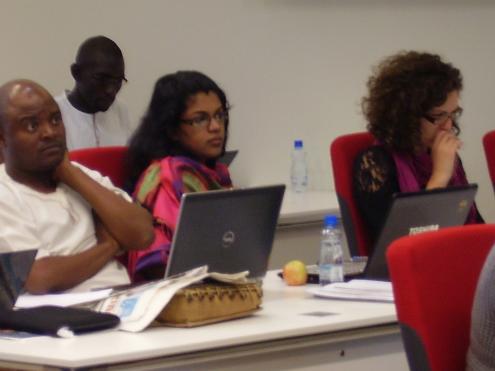Strategies, Working Groups and Regional Cooperation in Bonn
9 July 2013

Vositha Wijenayake
CAN South Asia
It has been a little tough to put words together to come up with a sensible piece of writing for the second half of the Bonn sessions. It could be that there were so many things I wanted to write on, and then the brain would fail at picking which thematic area, or activity I need to follow on. Hence the delay in putting this together, and not presenting it immediately at the closure of Bonn talks. Then again, the delay would have given me a better perspective of what needs to added, what the two worlds of grass-root activism and the UNFCCC corridors have in common or NOT have in common. Simply put, it would mean that I am now settling down to type these words with a regional perspective as well as a local perspective which is definitely heightened post-Bonn.
Focusing on legal issues is what I follow during the UNFCCC process, while working on the Southern Voices Project, which focuses on regional capacity building to raise the voices of the South in the discussion and building the skills of advocacy to ensure enforcement of policies that are beneficial at the grass-root level. Southern Voices workshop held on the 10th and 11th of June brought the possibility to those attending the Bonn session to develop their knowledge on what is happening in the different regions, by sharing information on their activities, as well as through panel discussions. The workshop focused on thematic areas such as adaptation and climate finance, and also on communicating the work on the ground to those outside. It was an eye-opener on certain levels to what could be lacking in our work, as well as identifying what could be lessons learnt from each other.
Speaking on law and the UNFCCC, it was somewhat evident that international law was very much linked with country politics. We respect the concept of sovereign equality and thus end at logger-heads, unable to move forward when one or few countries block the process. A simple answer to a question requires a lot of analysis, (if one of course does not want others to get into trouble thanks to the brilliant advise one provides). Article 3 para 7 ter seemed to occupy a lot of my time since jumping the guy too fast on responding to a query, and then deciding that I need to sit down and read the whole development of the section before reaching a decision. Bonn has definitely been a learning experience when it comes to the involvement in the legal group in that, since being introduced to the group in Doha, I have finally started to get a grasp of the pace at which it moves. So more focus on the ADP and the proposals for legal structure on the work front for the next months ahead!
Low Carbon Development strategies and Communication also played a key role during this process. While LCD strategy is worked on for more elaboration and active involvement of different domestic and international actors, a communications workshop on the 16th of June, helped my understanding of the strategies of communicating science in a language that people do understand. The psychology based analysis of three types of people in a society seemed something to build on for campaigns, and possibly improving my personal communication with the world at large.
UNFCCC sessions in Bonn was definitely a time for contemplating on how to move forward as a movement, and as a regional entity as well. It was about building regional and international capacity while developing the leadership among regions. And I close the post with hopes for more theme specific writing for November!

